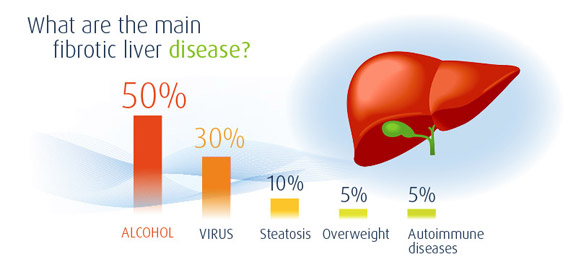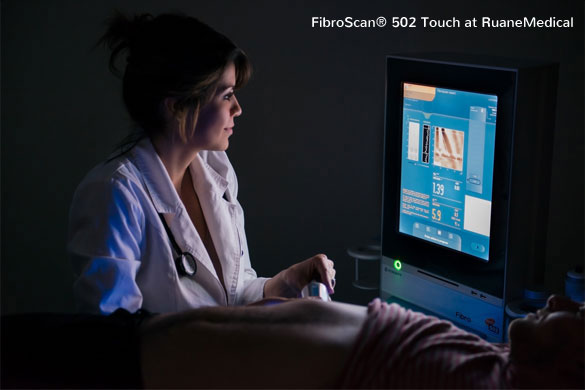
Alcoholic cirrhosis is the primary type of cirrhosis in the U.S.
It develops in 10 - 20% of heavy drinkers, usually after 10 - 15 years of heavy alcohol consumption.
The new FibroScan can measure alcohol related liver fibrosis without a painful biopsy:
FibroScan® is a new medical device in the United States (approved by the FDA on April 5th 2013) that provides a quick, painless and reliable alternative to liver biopsy. Ruane Medical is the first in Los Angeles to offer the test to patients with the FibroScan® 502 device.



Alcoholic liver disease is damage to the liver and its function due to alcohol abuse.
Causes
Alcoholic liver disease occurs after years of heavy drinking. Alcohol can cause inflammation in the liver. Over time, scarring and cirrhosis can occur. Cirrhosis is the final phase of alcoholic liver disease.
Alcoholic liver disease does not occur in all heavy drinkers. The chances of getting liver disease go up the longer you have been drinking and more alcohol you consume. You do not have to get drunk for the disease to happen.
The disease seems to be more common in some families. Women may be more likely to have this problem than men.
Symptoms
Symptoms vary, based on how bad the disease is. You may not have symptoms in the early stages. Symptoms tend to be worse after a period of heavy drinking.
Digestive symptoms include:
- Pain and swelling in the abdomen
- Decreased appetite and weight loss
- Nausea and vomiting
- Fatigue
- Dry mouth and increased thirst
- Bleeding from enlarged veins in the walls of the lower part of the esophagus (tube that connects your throat to your stomach)
Skin problems such as:
- Yellow color in the skin, mucus membranes, or eyes (jaundice)
- Small, red spider-like veins on the skin
- Very dark or pale skin
- Redness on the feet or hands
- Itching
Brain and nervous system symptoms include:
- Problems with thinking, memory, and mood
- Fainting and lightheadedness
- Numbness in legs and feet
Treatment
The most important part of treatment is to stop using alcohol completely. If liver cirrhosis has not yet occurred, the liver can heal if you stop drinking alcohol.
An alcohol rehabilitation program or counseling may be necessary to break the alcohol addiction. Vitamins, especially B-complex and folic acid, can help reverse malnutrition.
If cirrhosis develops, you may need to manage the complications of cirrhosis. You may need a liver transplant if there has been a lot of liver damage.
Outlook (Prognosis)
Continued excessive drinking can shorten your lifespan. Your risk for complications such as bleeding, brain changes, and severe liver damage go up. The outcome will likely be poor if you keep drinking.
When to Contact a Medical Professional
Call your health care provider if:
- You develop symptoms of alcoholic liver disease.
- You develop symptoms after a long period of heavy drinking.
- You are worried that drinking may be harming your health.
Prevention
Talk to your doctor about your alcohol intake. The doctor can counsel you about how much alcohol is safe for you.
Alternative Names
Liver disease due to alcohol; Cirrhosis or hepatitis - alcoholic; Laennec's cirrhosis
- "FibroScan is effective to assess liver fibrosis in alcoholic patients. Instant screening of liver fibrosis in heavy drinkers is feasible without liver biopsy."
- "Liver stiffness measurement (FibroScan) accurately assesses extensive fibrosis and cirrhosis in alcoholic patients."(National Center for Biotechnology Information)
Scheduling a FibroScan Examination
To arrange a FibroScan call our FibroScan line at 310-710-5220 or you can fill out the schedule form right here.
Frequently Asked Questions
- Is the FibroScan test expensive?
The FibroScan test costs much less than a liver biopsy, and it is now billable to insurance.
Ruane Medical accepts most PPO and Medicare insurance policies (co-pays/deductibles apply). Cash rates are available for patients with HMO insurance plans or no insurance.
Contact us for information about insurance or cash rates.
- Does my Health Insurance cover FibroScan?
FibroScan technology is new to the United States and is not yet covered by insurance.
- Do I have to get a referral from a doctor?
No, you don’t need a referral. You can just call us and schedule an appointment for the test.
- Is this a painful test, are there needles involved?
No. This is a non-invasive test, much like an ultrasound. There is no needle, and all you feel is a gentle shock wave on your skin.
- When are results delivered?
Test results are immediate. Our office can send it to your doctor upon your request.
- Who will be conducting the FibroScan test?
We have several medical staff and clinical researchers, both male and female who are trained and certified for FibroScan.
- How do I prepare for the FibroScan test?
Do not eat and drink for 3 hours before the test.
- I am heavy. Is this a problem?
No, our Fibroscan has both the regular and the XL probe.


